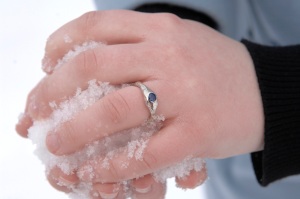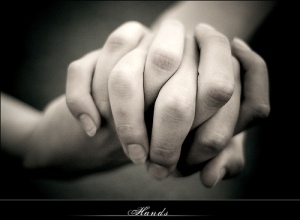You are currently browsing the tag archive for the ‘Couples’ tag.
My husband and I have been married for just over two years now. One of the things that we really like to do together is go for walks. We walk through our tree-lined neighborhood, holding hands, and chat about our days, the weather, all of that average, mundane stuff that relationships are made of. I treasure those walks.
While we are walking, we rarely get a second glance. A neighbor or two might glance up and smile in greeting or extend an “ ‘Evening” but rarely do we get much more than that. I’m okay with that. We aren’t out for a walk to be recognized or announce anything about ourselves to anyone else. We are simply strolling at dusk, anonymous and happy.
While we are walking, we are anonymous. We are just a couple, like any other.
Another couple might be walking at the same time we are walking. They, too, might have been together for over five years and be highly committed. They may presently struggle with many of the same things young couples struggle with: defining their couplehood, maintaining family of origin relationships and navigating emergent adulthood. They, too, may someday plan on buying a house, planting a garden and raising children.
When this couple walks, though, they are not anonymous. They may be gay or lesbian, biracial, or have any the other characteristics that seem to require explanation. In short, they deviate from “the norm.”
Over the past year, this has really struck me. When I’m thinking about what being oppressed and privileged means, I think that one of the primary clues that I’m thinking about a category of privilege is that it does not require explanation. When my husband and I walk at dusk, I feel like I can rest assured that nothing is assumed about us. We could be liberal or conservative, parents or childless, in touch with our families or not.
As far as I know, holding my husband’s hand is not regularly construed as an overt political statement.
One of my assumptions is that all people have been both recipients of privilege and victims of oppression. Where in your life are you oppressed? Where in your life are you privileged? If you are having trouble defining these areas, think about the parts of your life and context that demand explanation. What does that mean?
*Many thanks to Dr. Terri Karis and Dr. Bruce Kuehl, two professors at the University of Wisconsin-Stout, who got these ideas rolling.
After a romantic break up, individuals may experience a sense of fragility and inconsistency in their own self-concept. In the midst of that fragility, individuals usually re-organize their self-concept into something different and possibly new. That new may include narratives of both resiliency and victimhood. It seems to me that the saying “what doesn’t kill you makes you stronger” may apply here. How do you think that new whole is determined?
SAGE Publications (2010, March 8). How a romantic breakup affects self-concept. ScienceDaily. Retrieved March 8, 2010, from http://www.sciencedaily.com /releases/2010/03/100308132139.htm
Two year ago when Jon and I were talking about getting engaged, he brought up the idea of not getting a diamond engagement ring. As I had at the time bought into the propaganda put out by the wedding industry about the “tradition” and “timelessness” of that magical diamond ring, I felt a bit put off. However, Jon had done some research and found out more about the diamond wars and blood diamonds and together we decided that we did not want to so pointedly support an industry that funded civil war. The Kimberly Process was already in place at this time, so hypothetically we could have avoided buying a blood diamond, but as the Kimberly Process was being monitored by the industry itself it seemed like a bit of a foregone conclusion to think that it would actually to a sufficient job stemming the flow of conflict diamonds into the marketplace. Instead, we decided on a sapphire because blue is my favorite color.

Picture by Glen Stubbe
True to our worries, a story in the BBC this past weekend reports the increasing concern that the Kimberly Process is not adequately addressing this concerns. If you are thinking about getting engaged, or just buying a diamond for some other reason, I would like to encourage you to consider using a vintage diamond, a different stone, or a diamond alternative to avoid these concerns. I love my sapphire ring and although others are sometimes confused by the lack of diamond on my left ring finger, I feel proud for taking a stand with Jon for our principles.
From BBC News: http://news.bbc.co.uk/2/hi/africa/8116239.stm
A study put out by Stony Brook University found that long term relationships do not necessarily need to fizzle into non-sexual, companionship love. Types of love were characterized as:
- Friendship Love (just what it sounds like)
- Passionate Love (friendship + sexual interest + obsessive)
- Romantic Love (friendship + sexual interest)
Passionate love was found to make only short term relationships happy. Romantic love was found to not only exist in both short and long term relationships, but also improve the quality of both kinds of relationships. Couples don’t need to get settled into a long term relationship and expect that sexual interest will fade. Like all good things, it can be maintained with commitment.
American Psychological Association (2009, March 21). Contrary To Widely Held Beliefs, Romance Can Last In Long-term Relationships, Say Researchers. ScienceDaily. Retrieved April 9, 2009, from http://www.sciencedaily.com /releases/2009/03/090317153039.htm



